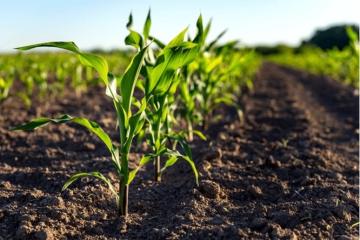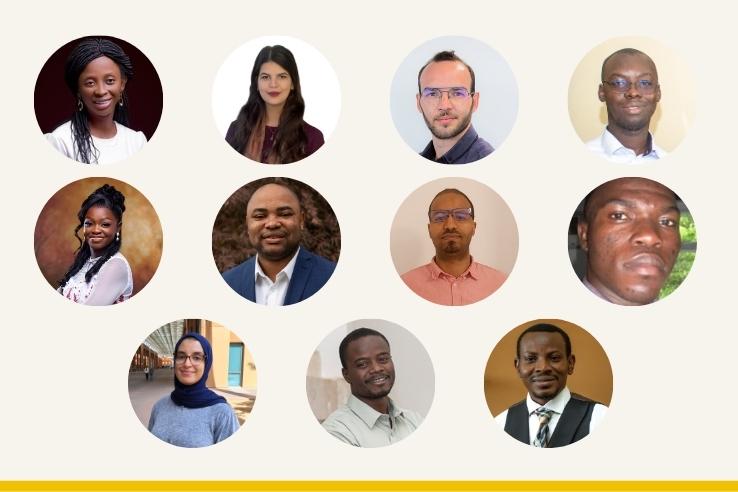
Advancing agricultural transformation through locally-led research

The UM6P–J-PAL Applied Lab for Agriculture (UJALA) is proud to welcome the first cohort of African Scholars, a group of exceptional researchers from across the continent committed to generating rigorous, policy-relevant evidence for Africa’s agricultural transformation.
Launched in 2025, the UJALA African Scholars Program builds a community of early and mid-career African researchers equipped to design, implement, and lead high-quality impact evaluations. In collaboration with the Mohammed VI Polytechnic University (UM6P), the program empowers scholars to translate evidence into practice, bridging the gap between research and agricultural policy.
A tailored approach to building Africa’s evidence leaders
What makes the UJALA African Scholars Program distinctive is its customized, practice-oriented learning journey. Over six months, scholars participate in a blended learning experience combining MITx/J-PAL coursework with UJALA-designed webinars that turn theory into practice. The sessions, led by J-PAL affiliated researchers and UJALA staff—guide scholars through each stage of research design, from building a theory of change and defining measurement strategies to developing implementation plans, budgets, and risk-mitigation frameworks.
Each scholar also benefits from individual mentorship by J-PAL affiliated and invited professors and UJALA senior staff, who guide them through every stage of research design, from conceptualization to pilot proposal development. The program culminates in the design of pilot projects directly informed by the UJALA Research Agenda, which focuses on generating evidence to support small-scale farmers’ food security, productivity, and profitability.
This integrated structure ensures that every participant’s learning journey connects academic rigor with real implementation challenges on the ground, preparing them to contribute not only as researchers but as evidence leaders shaping policy dialogue.
A diverse and talented first cohort
The first cohort of UJALA African Scholars represents a diverse range of expertise—from agricultural and environmental economics to psychology, remote sensing, and development policy. Together, they embody UJALA’s vision to strengthen African scholars’ capacity to generate and apply evidence for sustainable agricultural growth.
Meet the 2025 UJALA African Scholars
Oluwaremilekun Ayobami Adebisi (Nigeria)
Research Fellow at the Institute for Food Security and Commercial Agriculture, Federal University Oye-Ekiti in Nigeria. Oluwaremilekun applies rigorous evaluation methods to study food security, gender, climate change, and rural health.
Banawe Anissa (Togo)
Statistician and Applied Economist at the University of Lomé’s Center for Research in Applied Economics and Management of Organizations in Togo. Banawe’s research in experimental economics and mechanism design examines how market incentives influence technology adoption and investment behavior in agriculture.
Bouthayna El Amine (Morocco)
Postdoctoral researcher at UM6P’s College of Sustainable Agriculture and Environmental Sciences under the Africa Carbon Flagship Program. Bouthayna’s research spans adaptation strategies, climate technologies, and gendered innovation in agri-food systems. She leads the NSF-funded Collaborative Learning School in Morocco and the British Council’s Women of the Argan Biosphere project.
Salma El Idrissi Essebtey (Morocco)
Postdoctoral researcher at UM6P’s Center for Remote Sensing Applications. Salma combines satellite data, crop-growth models, and machine learning to monitor rainfed wheat and forecast yields in Morocco. Through UJALA, she bridges Earth observation with econometrics to inform agricultural policy under climate stress.
Soumaïla Gansonré (Burkina Faso)
Assistant Professor of Economics at Université Joseph Ki-Zerbo in Burkina Faso. Soumaila’s work explores how markets, climate, and agriculture affect smallholder livelihoods.
Fissha Asmare Marye (Ethiopia)
Research Fellow in Environmental and Agricultural Economics at Scotland’s Rural College (SRUC) and International Associate at the Environment and Climate Research Centre (ECRC), Ethiopia. His research explores how climate change and behavioral factors influence production and environmental efficiency in agriculture.
Karim Nchare (Cameroon)
Senior Lecturer in Economics at Vanderbilt University. Karim is an econometrician specializing in theoretical and applied econometrics. He holds multiple MSc from the University of Yaoundé I in Cameroon and a PhD in Economics from Pennsylvania State University. His research spans agricultural economics, development economics, and decision sciences.
Toyin Samuel Olowogbon (Nigeria)
Postdoctoral Research Fellow at the Institute for Food Security and Commercial Agriculture, Federal University Oye-Ekiti in Nigeria. Toyin is a consultant to Precision Development (PxD), and his SOFADRICLIMATE App delivers localized weather forecasts and insurance services to thousands of Nigerian farmers.
Hephzibah Onyeje Obekpa (Nigeria)
Senior Lecturer in Agricultural Economics at Joseph Sarwuan Tarka University. Her research explores how environmental and economic factors shape rural livelihoods, food security, and climate resilience in Sub-Saharan Africa. Hephzibah also contributes to gender-inclusive capacity-building programs under the World Bank’s Centre of Excellence in Social Standards.
Emmanuel Trouche (Morocco)
Assistant Professor at UM6P’s Faculty of Governance, Economics and Social Sciences. Emmanuel studies learning, reasoning, and belief revision through experimental methods. His research informs Morocco’s education policy through the PASEM project on Arabic literacy and early mathematics.
Henri Zoungrana (Burkina Faso)
Economist specializing in climate change, agricultural productivity, and adaptation finance. Henri’s work focuses on how climate variability affects agricultural performance and food security across Africa.
Looking ahead
By combining advanced training and mentorship, the UJALA African Scholars Program strengthens Africa’s capacity to lead its own evidence-to-policy agenda. This inaugural cohort marks an important step toward a continent-wide network of scholars who will design and implement solutions rooted in data, driven by science, and responsive to the realities of small-scale farmers.

